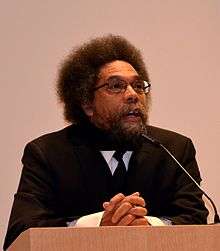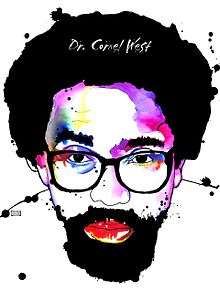.jpg)
The rule of Big Money and its attendant culture of cupidity and mendacity has so poisoned our hearts, minds and souls that a dominant self-righteous neoliberal soulcraft of smartness, dollars and bombs thrives with little opposition.

I remind young people everywhere I go, one of the worst things the older generation did was to tell them for twenty-five years "Be successful, be successful, be successful" as opposed to "Be great, be great, be great". There's a qualititative difference.
Cornel Ronald West (born 2 June 1953 in Tulsa, Oklahoma) is an American philosopher, political activist, social critic, author, and public intellectual. The son of a Baptist minister, West focuses on the role of race, gender, and class in American society and the means by which people act and react to their "radical conditionedness." A radical democratic socialist, West draws intellectual contributions from multiple traditions, including Christianity, the black church, Marxism, neopragmatism, and transcendentalism. Among his most influential books are Race Matters (1994) and Democracy Matters (2004).
Quotes
- I focus on popular culture because I focus on those areas where black humanity is most powerfully expressed, where black people have been able to articulate their sense of the world in a profound manner. And I see this primarily in popular culture. Why not in highbrow culture? Because the access has been so difficult. Why not in more academic forms? Because academic exclusion has been the rule for so long for large numbers of black people that black culture, for me, becomes a search for where black people have left their imprint and fundamentally made a difference in terms of how certain art forms are understood. This is currently in popular culture. And it has been primarily in music, religion, visual arts and fashion.
- "Cornel West interviewed by bell hooks" in Breaking Bread: Insurgent Black Intellectual Life (1991)
- In situations of sparse resources along with degraded self-images and depoliticized sensibilities, one avenue for poor people is in existential rebellion and anarchic expression. The capacity to produce social chaos is the last resort of desperate people.
- "The Role of Law in Progressive Politics" in Keeping Faith: Philosophy and Race in America (1993)
- The Enlightenment worldview held by Du Bois is ultimately inadequate, and, in many ways, antiquated, for our time. The tragic plight and absurd predicament of Africans here and abroad requires a more profound interpretation of the human condition — one that goes beyond the false dichotomies of expert knowledge vs. mass ignorance, individual autonomy vs. dogmatic authority, and self-mastery vs. intolerant tradition.
- The Future of the Race (1997) by Henry Louis Gates, Jr. and Cornel West, p. 64
- To be an intellectual really means to speak a truth that allows suffering to speak.
- "Chekhov, Coltrane, and Democracy: Interview by David Lionel Smith." in The Cornel West Reader (1998)
- Analytical philosophy was very interesting. It always struck me as being very interesting and full of tremendous intellectual curiosities. It is wonderful to see the mind at work in such an intense manner, but, for me, it was still too far removed from my own issues.
- Interview in African-American Philosophers: 17 Conversations (1998) edited by George Yancy, p. 35
- The authority of science … promotes and encourages the activity of observing, comparing, measuring and ordering the physical characteristics of human bodies.… Cartesian epistemology and classical ideals produced forms of rationality, scientificity and objectivity that, though efficacious in the quest for truth and knowledge, prohibited the intelligibility and legitimacy of black equality…. In fact, to "think" such an idea was to be deemed irrational, barbaric or mad.
- Prophesy Deliverance! (2002)
- I remind young people everywhere I go, one of the worst things the older generation did was to tell them for twenty-five years "Be successful, be successful, be successful" as opposed to "Be great, be great, be great". There's a qualitative difference.
- Speech in San Francisco: Democracy Matters (1 October 2004)
- Free-market fundamentalism trivializes the concern for public interest. It puts fear and insecurity in the hearts of anxiety-ridden workers. It also makes money-driven, poll-obsessed elected officials deferential to corporate goals of profit – often at the cost of the common good. … The free-market fundamentalism that prevails in the United States today promotes the pervasive sleepwalking of the populace. People see that the false prophets are handsomely rewarded — with money, status and access to more power. … We are experiencing the sad gangsterization of America — an unbridled grasp at power, wealth and status.
- To many, our democratic system seems so broken that they have simply lost faith that their participation could really matter. The politics of self-interest and catering to narrow special interests is so dominant that so many ask themselves: Why vote? … The political discourse is so formulaic, so tailored into poll-driven, focus-group-approved slogans that don't really say anything substantive or strike at the core of our lived experience.
- "Cornel West: Democracy Matters" in The Globalist (24 January 2005)
- You can't lead the people if you don't love the people. You can't save the people, if you don't serve the people.
- Hope on a Tightrope: Words and Wisdom (2008); also on "The Way I See It" Starbucks Coffee Cup #284
- Justice is what love looks like in public.
- Brother West (2009), p. 232
- From whence are these "rights of individuals" derived, and why should we care? Unless we presume the existence of some greater power that determines what is good, isn't it arbitrary to posit that human survival is more important than private property rights, an equally artificially construed concept? Isn't it arbitrary to assume that some sort of equality is preferable to a system where, say, the poor are assumed to have bad karma? If these 'rights of individuals' are derived only from shared humanity, then do 'individuals' (a thoroughly meaningless term, by the way), begin to lose them when they act inhumanely? And isn't it totally arbitrary to grant rights to humans rather than other creatures anyway?
- Lecture in New Haven, On Constructed Rights (28 February 2013)
- The rule of Big Money and its attendant culture of cupidity and mendacity has so poisoned our hearts, minds and souls that a dominant self-righteous neoliberal soulcraft of smartness, dollars and bombs thrives with little opposition.
- "America is spiritually bankrupt. We must fight back together." The Guardian, January 14, 2018
- Well, as you know, I was blessed to do over a hundred events for my dear brother [Bernie Sanders]. And this is the first time I’ve had a chance to publicly endorse him again, but yes, indeed. I’ll be in his corner that we’re going to win this time. And it has to do with the Martin Luther King like criteria of assessing a candidate namely the issues of militarism, poverty, materialism, and racism, xenophobia in all of its forms that includes any kind of racism as you know against black people, brown people, yellow people, anybody, Arabs, Muslims, Jews, Palestinians, Kashmirians, Tibetans and so forth. So that there’s no doubt that the my dear brother Bernie stands shoulders above any of the other candidates running in the Democratic primary when it comes to that Martin Luther King-like standards or criteria.
- Quoted in: Cornel West on Bernie, Trump, and Racism, The Intercept, Mehdi Hasan (7 March 2019)
- [Bernie Sanders is]...an anti-racist in his heart. Two, he’s old-school. He’s like me. He doesn’t know the buzzwords. He doesn’t endorse reparations, one moment in the last 30 years, silent on it. He has the consistency over the years decade after decade and therefore it’s true in his language, in his rhetoric. There are times in which he doesn’t... use the same kind of buzzwords. But when it comes to his fight against racism, going to jail in Chicago as a younger brother and he would go to jail again. He and I would go to jail together again in terms of fighting against police brutality. So in that sense, I would just tell my brothers and sisters, but especially my chocolate ones that they shouldn’t be blinded by certain kinds of words they’re looking for, that in the end, he is a long distance runner in the struggle against white supremacy.
- Quoted in: Cornel West on Bernie, Trump, and Racism, The Intercept, Mehdi Hasan (7 March 2019)
External links
This article is issued from
Wikiquote.
The text is licensed under Creative
Commons - Attribution - Sharealike.
Additional terms may apply for the media files.

